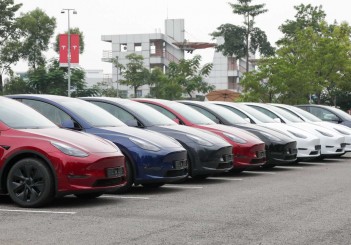SAN FRANCISCO: Tesla's current range of cars is far from perfect yet their owners love them so much that they overlook quality or reliability shortfalls. This is the main finding from a new JD Power study — "Tesla: Beyond the Hype" published on Tuesday — into how the electric car company stands against the competition and the image that it has cultivated among its owners.
"Tesla owners see themselves as pioneers who enjoy being early adopters of new technology," said Kathleen Rizk, director, global automotive consulting at J.D. Power. And as a result they're making allowances for the marque's shortfalls in the same way that early adopters of the iPhone were happy to live without features like picture messaging.
Considering the company's tiny share of the global automotive market — fewer than 80,000 cars sold in 2016 — Tesla receives a hugely disproportionate amount of media attention.
However, if your vehicles are seen as spearheading a new, cleaner form of personal mobility that could someday become the norm, the excitement that surrounds the firm is understandable.
And while there is no questioning the company's battery technology or excellence at using social media channels in particular for promoting its image, what has been very difficult to measure until now is how Teslas stack up against the establishment in other areas such as quality and reliability.
This is mostly because the company doesn't sell enough cars in any country to make the cut in in-depth multi-year studies into quality and reliability such as those for which JD Power made its name. The sample groups are just too small.
That hasn't stopped Consumer Reports from attempting to qualify the car. In 2015, the Model S was ranked as worse than average for reliability and at the end of last year, it moved up to "average" based on reviews and problems from a group of little more than 1,000 owners.
Yet Tesla's brand image continues to grow, so to try to understand why and to analyse the company in the same way as established marques, JD Power used a number of Tesla-owning focus groups as well as performing a number of side-by side tests.
And the simple answer is that the car simply inspires affection. "Spending US$100,000 (RM443,000) or more on a vehicle that has so many problems usually would have a dramatically negative effect on sales and brand perception. Right now, though, Tesla seems immune from such disenchanted customers," Rizk noted.
However, unless the company can iron out some of these reliability issues, the love affair could be at risk of ending when the affordable Model 3 goes on sale.
"When consumers buy a mass-market car priced around US$35,000 (RM156,000) that will be their primary mode of transportation, the degree of expectation will increase immensely," Rizk said. "We've seen that with other well-liked brands, whether or not it involves an electric vehicle."










